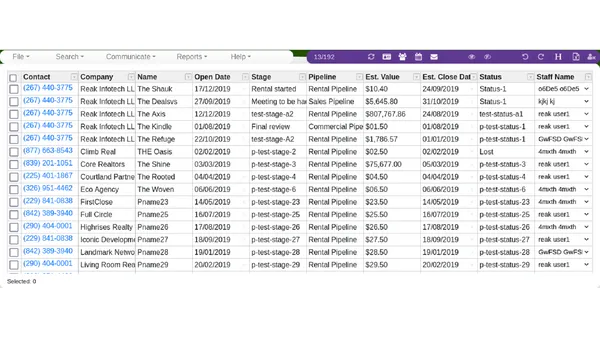Small Business CRM Application
CRM System for Small Business to manage their business better.
Client
SaaS Product
Date
February 10, 2023
Categories
Golang Python CRM Dropbox / Email Integrations
Small Business CRM Application
For small businesses, managing leads, documents, invoices, and emails can be a time-consuming and challenging task. Keeping track of all these elements can be overwhelming, and without a centralized system, it can be difficult to stay organized and productive.
To address this challenge, we have developed a CRM system specifically designed for small businesses. This system helps businesses manage all of their leads, documents, invoices, and emails from a single, easy-to-use dashboard.
Benefits of a Clinic Management System
-
Increased Productivity: By centralizing all of the important elements of a business, the CRM system helps businesses increase their productivity and stay organized.
-
Better Lead Management: The lead management module helps businesses capture new leads and follow up on existing ones, increasing the chances of closing deals and generating new business.
-
Improved Document Management: The document management module makes it easy for businesses to store and access all of their important documents in one place, reducing the risk of lost or misfiled documents.
-
Efficient Invoice Management: The invoice management module makes it easy for businesses to create, send, and manage invoices, reducing the time and effort required to manage this critical aspect of their operations.
-
Centralized Communication: By integrating with email providers, the CRM system centralizes all communication and eliminates the need to switch between multiple systems.
-
Automated File Management: The integration with file storage providers eliminates the need to manually transfer files, freeing up time and resources for other important tasks.
Features of a Clinic Management System

-
Lead Management: The CRM system allows businesses to manage their leads, including capturing new leads, tracking lead status, and managing follow-up activities. This makes it easy to keep track of all leads and ensure that no opportunities are missed.
-
Document Management: The CRM system includes a document management module, which allows businesses to store, manage, and access all of their important documents in one place. This includes contracts, proposals, invoices, and more.
-
Invoice Management: The CRM system includes an invoice management module, which allows businesses to create, send, and manage invoices all from one place. This makes it easy to keep track of payments and ensure that invoices are paid on time.
-
Email Integration: The CRM system integrates with email providers, such as Gmail and Outlook, to allow businesses to read and write emails directly from the application itself. This eliminates the need to switch between multiple systems and ensures that all communication is centralized.


-
File Management: The CRM system integrates with file storage providers, such as Dropbox, to automatically manage files via API. This makes it easy to access and store files, and eliminates the need to manually transfer files between systems.
-
Mobile Accessibility: The CRM system is fully mobile-responsive, allowing businesses to access their leads, documents, invoices, and emails from their phone or tablet on the go.
Conclusion
A clinic management system can be a valuable tool for healthcare providers looking to improve patient care and streamline operations. By providing comprehensive patient records, appointment scheduling and management, billing and payment processing, procedure management, and reporting and analytics, a clinic management system can help healthcare providers optimize their workflow and increase efficiency.








